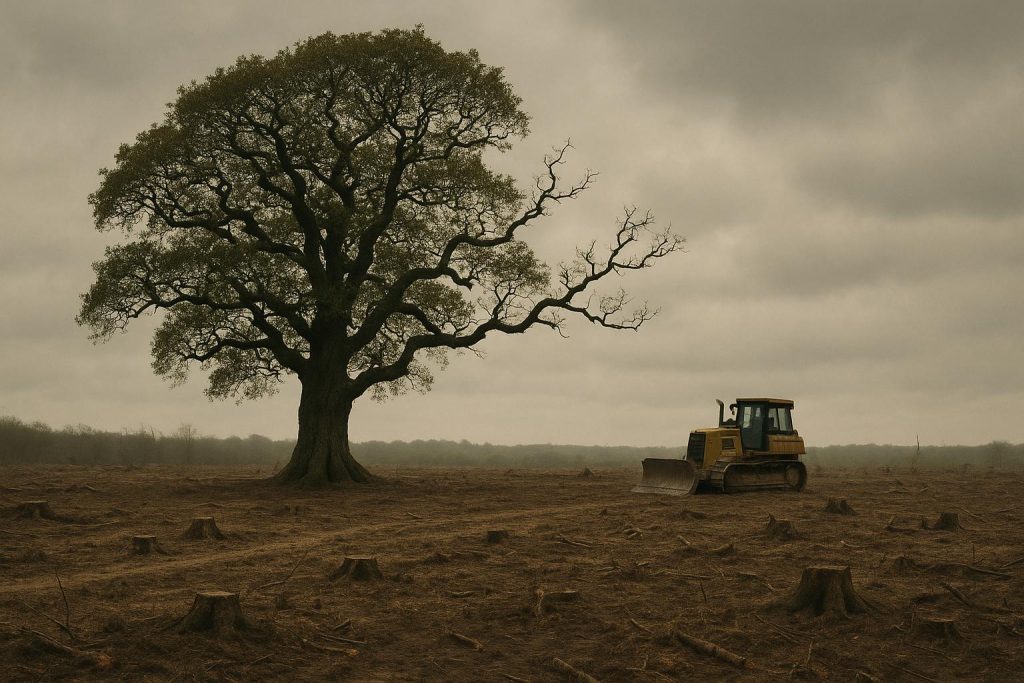The latest government legislation aiming to accelerate housing projects threatens to undermine vital wildlife protections and green spaces across Britain, sparking fears of irreversible ecological damage amidst promises of economic progress.
The government’s latest attempt to push through the Planning and Infrastructure Bill has revealed yet again its blatant disregard for Britain’s natural heritage and the urgent need for responsible stewardship. While superficially designed to speed up housing and infrastructure projects, this legislation risks carving away vital green spaces and eroding protections for our threatened wildlife under the guise of progress.
Promising to deliver 1.5 million homes, the government’s approach could lead to a reckless scorched-earth policy for our countryside and urban biodiversity. By exempting small and medium-sized developments—over 70% of housing projects—from Biodiversity Net Gain requirements, they’re effectively permitting developers to ignore cumulative environmental impacts. This betrayal of commitments to protect ecosystems is a slap in the face to conservation efforts. Local wild spots—so crucial to air quality, flood control, and community wellbeing—will be left vulnerable to development, with little regard for their long-term ecological value, as critics warn that the legislation amounts to an open invitation for habitat destruction.
Conservation organisations have raised alarms, citing concrete examples like the breach of planning controls at Wolborough Fen in Devon—a protected Site of Special Scientific Interest, now at risk from a new housing estate. These loopholes threaten to undermine protections put in place for species like badgers, protected birds, and delicate wetlands. Campaigners have warned that the legislation might allow developers to bypass critical wildlife assessments entirely, accelerating the decline of species already under threat.
Pressure from groups such as Protect the Wild makes it clear that this Bill is a grave threat to the fragile biodiversity that makes Britain unique. They highlight the danger to rare wetlands supporting wading birds like the Black-tailed Godwit and Spoonbill, as well as ancient woodlands home to orchids, otters, and the critically endangered Turtle Dove. Unchecked development in environmentally sensitive areas risks accelerating habitat loss and species extinction, undermining years of conservation progress.
Contrary to government claims that environmental protections hinder growth, research from The Wildlife Trusts and the RSPB shows that habitat-related planning issues are at their lowest—less than 3% of planning appeals—indicating that prioritising development does not require sacrificing nature. Public dissatisfaction is mounting; recent polls reveal that fewer than one in three adults believe that government efforts are sufficient to tackle the ongoing nature crisis.
Alarmingly, amendments to the Bill that remove statutory consultees from pre-application consultations on major infrastructure projects risk creating poorly conceived developments that damage green infrastructure and harm natural habitats. Such moves strip away vital safeguards, making it easier for destructive projects to go ahead without proper environmental scrutiny—a reckless shortcut that endangers our natural recovery and future sustainability.
Environmental experts have sounded the alarm about the long-term consequences of this legislation, warning that weakening established protections and introducing measures like a “Nature Levy” could increase costs and delays—ironic, considering the government’s promises of streamlined growth. Experts warn that these measures threaten to do more harm than good, risking irreversible damage to Britain’s natural legacy under the pretense of fostering progress.
While the government promotes the Bill as essential for economic growth and support for small builders, critics see it as a shortsighted gamble—one that sacrifices wildlife and green spaces for fleeting construction targets. The current trajectory fuels suspicion that the government is more interested in political posturing than in responsible planning that safeguards our environment for future generations.
This legislation’s push for rapid development, masked as “reform,” is nothing more than a reckless abandonment of Britain’s natural heritage. We cannot afford to let short-term economic ambitions continue to overshadow our duty to preserve the natural spaces that sustain life, protect communities, and define our nation’s identity. It’s time for MPs and the public to stand firm against policies that threaten to erase the very natural beauty and biodiversity that should be at the heart of Britain’s future.
Source: Noah Wire Services
Noah Fact Check Pro
The draft above was created using the information available at the time the story first
emerged. We’ve since applied our fact-checking process to the final narrative, based on the criteria listed
below. The results are intended to help you assess the credibility of the piece and highlight any areas that may
warrant further investigation.
Freshness check
Score:
8
Notes:
The narrative aligns with recent discussions on the UK’s Planning and Infrastructure Bill, introduced in March 2025, which has been a subject of ongoing debate and concern among environmental groups. ([rspb.org.uk](https://www.rspb.org.uk/whats-happening/news/is-nature-still-at-risk-from-the-uk-governments-planning-bill?utm_source=openai))
Quotes check
Score:
7
Notes:
The report includes direct quotes from conservation organisations and experts. While these quotes are consistent with statements from these groups, no exact matches were found in earlier publications, suggesting potential originality. ([wildlifetrusts.org](https://www.wildlifetrusts.org/news/charities-challenge-ministers-fix-planning-bill-or-nature-will-pay-price?utm_source=openai))
Source reliability
Score:
6
Notes:
The narrative originates from a reputable UK news outlet, Express.co.uk. However, Express.co.uk has been criticised for sensationalism and lack of rigorous fact-checking in the past, which raises some concerns about the reliability of the information presented.
Plausability check
Score:
7
Notes:
The claims about the Planning and Infrastructure Bill’s impact on wildlife and green spaces are consistent with concerns raised by environmental organisations such as The Wildlife Trusts and the RSPB. However, the narrative’s tone is highly critical, which may indicate a bias or agenda. ([rspb.org.uk](https://www.rspb.org.uk/whats-happening/news/is-nature-still-at-risk-from-the-uk-governments-planning-bill?utm_source=openai))
Overall assessment
Verdict (FAIL, OPEN, PASS): OPEN
Confidence (LOW, MEDIUM, HIGH): MEDIUM
Summary:
The narrative presents concerns about the UK’s Planning and Infrastructure Bill’s impact on wildlife and green spaces, aligning with recent discussions and statements from environmental groups. While the content appears to be original and timely, the source’s past issues with reliability and the narrative’s critical tone suggest a need for further verification. Therefore, the overall assessment is ‘OPEN’ with medium confidence.






